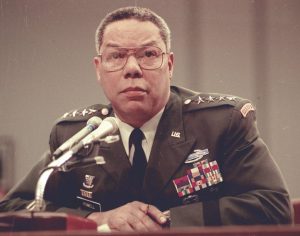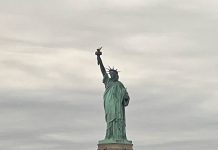A great patriot and soldier has passed. As Yahoo News reports, “Colin Powell, the first Black U.S. secretary of state and a trailblazing figure in Washington, died of complications from COVID-19 on Monday, according to his family.” Although Powell, age 84, was fully vaccinated, he was battling multiple myeloma, a blood cancer that suppresses immunity. Powell die while under treatment at Walter Reed National Medical Center. In a statement to the press, the family said, “We have lost a remarkable and loving husband, father, grandfather and a great American.”
President Biden said of Powell, “Colin embodied the highest ideals of both warrior and diplomat. He was committed to our nation’s strength and security above all. Having fought in wars, he understood better than anyone that military might alone was not enough to maintain our peace and prosperity. From his front-seat view of history, advising presidents and shaping our nation’s policies, Colin led with his personal commitment to the democratic values that make our country strong. Time and again, he put country before self, before party, before all else — in uniform and out — and it earned him the universal respect of the American people.”
Powell’s story is at once inspiring and humbling. The son of Jamaican immigrants Luther and Maud Powel, Colin Luther Powell was born on April 5, 1937, in Harlem, New York, and raised in the South Bronx, receiving his education in the New York City public schools, ultimately graduating from Morris High School in 1954. according to biography.com. After graduation, Powell attended City College of New York (CCNY), where he earned his bachelor’s degree in geology. While at CCNY, Powell participated in the ROTC program, eventually receiving a commission as an Army second lieutenant upon graduation in June 1958.
Powell was a military man through and through, serving our country in multiple capacities for several decades. Following graduation, Powell was sent to Fort Benning in Georgia for basic training, then assigned as a platoon leader in West Germany. It didn’t take long for Powell to understand the full scope and meaning of war. In 1962, while serving as an advisor to the South Vietnamese Army, Powell was wounded by a Viet Cong booby trap by stepping on a sharpened, buried piece of bamboo, which resulted in a large infection, thus ending his first tour in Vietnam.

Undaunted, Powell returned for a second tour of Vietnam, this time serving as assistant chief of staff of operations. Once again, Powell was injured, this time in a helicopter crash in which his bravery was evidenced by him pulling two soldiers from the burning wreckage, an act for which Powell was awarded the Soldier’s Medal. Ironically, one of the soldiers Powell saved from certain death was Jack Treadwell, a World War II Medal of Honor (MOH) recipient, which may be “the only time in history that any soldier earned the Soldier’s Medal for saving the life of a MOH recipient,” according to The Hall of Valor Project.
In keeping with the tenor of the divisiveness of Vietnam, Powell remained steadfast to what he perceived as a moral mission in Vietnam. His memoir shows him to be a man of quiet internal strength and an outward steely resolve.“Every morning,” Powell wrote, “I had to use my training and self-discipline to control my fear and move on. . . . [A]s a leader, I could show no fear.” Powell was acutely aware of the responsibilities of military leadership, but this attitude came at a cost.
As reported by History.net, while on patrol once, Powell “charged into the jungle in hot pursuit of the enemy, but before long he realized that not a single soldier had followed him.” Later, after insisting that his men wear a protective vest, a move that ended up saving lives, Powell was able to establish the respect needed for true leadership.
When allegations of mistreatment of south Vietnamese people by our military escalated in the March 1968 My Lai massacre, Powell defended our military presence, stating, “in direct refutation of this portrayal, relations between American soldiers and the Vietnamese people are excellent.” In 2004, Powell revised his perspective a bit, telling Larry King, I was in a unit that was responsible for My Lai. I got there after My Lai happened. So, in war, these sorts of horrible things happen every now and again, but they are still to be deplored.”
After Vietnam, having attained the rank of lieutenant colonel, Powell went on to earn a Master of Business Administration from Georgetown University, graduating in 1971. The following year, Powell participated in a White House Fellowship under the Nixon administration, where was assigned to the Office of Management and Budget. For several years after, Powell dedicated his career as a staffer in the Pentagon. In 1979, Powell served under the auspices of Secretary of Energy Charles Duncan. As Military Wikia reports, “When Powell was promoted to brigadier general in 1979, Duncan pinned on the medal.”
In 1983, Powell was named the senior military assistant to Defense Secretary Caspar Weinberger. Four years later, President Ronald Reagan named Powell his National Security Advisor, Becoming the first African American to serve in this role. However, it was his service as chairman of the Joint Chiefs of Staff under President George H.W. Bush where Powell defined his legacy, working to advance the concept of the “Powell Doctrine.”
Created in the run-up to the 1990-1991 gulf War, the Powell Doctrine “poses questions emphasizing national security interests, [and] overwhelming strike capabilities with an emphasis on ground forces, and widespread public support, all of which have to be answered affirmatively before military action is taken.”
The essence of the Powell Doctrine is to have a clear-cut sense of not only the mission but also ensuring that you have the forces to prosecute a war rapidly and successfully so that public opinion dies not to turn against the efforts, as happened in Vietnam. As Powell put it, “Down the road, that’s what I want to accomplish. I want to put the number of troops in that can take care of that problem, I want to have popular support, and I want to have an exit strategy. I want to go in, I want to accomplish it, and I want to get out.”
Powell’s career, however, was not without controversy. In the wake of September 11, while serving under George W. Bush, he advocated for a strong and rapid response against al Qaeda and demanded cooperation from Afghanistan and Pakistan. Eventually, Powell went on record implicating Sadam Hussein, the leader of Iraq, for his role in providing aid to terrorists in their plots against the United States.
Specifically, he alleged that Hussein had a stockpile of Weapons of Mass Destruction (WMD), making Iraq a threat to national security. Powell famously argued,“There can be no doubt that Saddam Hussein has biological weapons and the capability to rapidly produce more, many more.” Unfortunately for Powell, the WMD accusations turned out to be wrong, and this left a stain on an otherwise impeccable resume.
Powell later apologized for his role, saying, “I will always regret it. It was a terrible mistake on all our parts and on the intelligence community … I wish it had been different, I wish I had more time. Maybe if I had another week or two my instincts would have seen through this or been able to do double-checking, but I didn’t have more time. But I’m not looking for an excuse. I gave that presentation. I gave it believing that everything I had said had been double-sourced, triple-sourced, and was accurate, but it was not.”
When asked if his support for the invasion of Iraq would leave a blight on his otherwise tarnished record, Powell said, “Of course it will. It’s a blot. I’m the one who presented it on behalf of the United States to the world, and (it) will always be part of my record. It was painful. It’s painful now.”
The fallout from this misstep was part and parcel of Powell deciding to do an about-face on the Republican party. This culminated with his support for then-presidential candidate Barack Obama. Even though Powell had been a long-time advisor to John McCain, who was the Republican Candidate for president in 2008, Powell’s convictions led him to seek a different form of leadership for the country. To that end, Powell endorsed Obama, saying, “As gifted as (McCain) is, he is essentially going to execute the Republican agenda, the orthodoxy of the Republican agenda, with a new face and a maverick approach to it.”
Most recently, Powel voiced his concerns with the Republican party in the aftermath of the U.S. Capitol riots, observing, “They did, and that’s why I can no longer call myself a fellow Republican. I’m not a fellow of anything right now. I’m just a citizen who has voted Republican, voted Democrat throughout my entire career. And right now I’m just watching my country and not concerned with parties.”
Despite this blemish, the overall arc of Powell is one of incredible service, loyalty, and intelligent leadership. In addition to the many many military decorations, which include the Defense Superior Service Medal, Legion of Merit (with Oak Leaf Cluster), Soldier’s Medal, Bronze Star Medal, and the Purple Heart, Powell also received the President’s Citizens Medal, the Congressional Gold Medal, and the Secretary of Energy Distinguished Service Medal. Moreover, he was considered a dignitary in his own right, an honor which led him to numerous civilian awards, including most notably a French Legion of Honor and an honorary knighthood bestowed by H.M. Queen Elizabeth II of Great Britain.
Powell won many admirers along the way, even those with whom he had contentious relationships. Condoleezza Rice, who succeeded Powell at State following his retirement in 2005, said that Powell “was a trusted colleague and a dear friend through some very challenging times,” adding in her own statement that “much of his legacy will live on in the countless number of young lives he touched.”
George W. Bush pointed out not only Powell’s storied service record but his commitment to family, stating, “Many presidents relied on General Powell’s counsel and experience. He was National Security Adviser under President Reagan, Chairman of the Joint Chiefs of Staff under my father and President Clinton, and Secretary of State during my Administration. He was such a favorite of presidents that he earned the Presidential Medal of Freedom — twice. He was highly respected at home and abroad. And most important, Colin was a family man and a friend.”
President Obama expanded on the notion of his loyalty and service, saying, “Powell helped a generation of young people set their sights higher. He never denied the role that race played in his own life and in our society more broadly. But he also refused to accept that race would limit his dreams, and through his steady and principled leadership, helped pave the way for so many who would follow.”
And former Secretary of State Hillary Clinton called Powell “a courageous soldier, a skilled commander, a dedicated diplomat, and a good and decent man. The son of immigrants, he rose to the top levels of military, civilian, and non-governmental service through intelligence, character, and the ability to see the big picture and attend to the smallest details.”
At the end of the day, Powell exemplified duty, honor, and service. I believe he wanted, more than anything, for people to stop overidentifying with parties, and start identifying with each other. This is why his words ring so true:
“We have to start thinking of America as a family. We have to stop screeching screeching at each other, stop hurting each other, and instead start caring for, sacrificing for and sharing with each other … We cannot move forward if cynics and critics swoop down and pick apart anything that goes wrong, to a point where we lose sight of what is right, decent and uniquely good about America.”
In a world where we are becoming increasingly polarized, in a time where thoughtfulness and hardnosed practicality seems to be waning, Powell will be sorely missed.
At Newsweed.com, we adhere to three simple principles: truth, balance, and relatability. Our articles, podcasts, and videos strive to present content in an accurate, fair, yet compelling and timely manner. We avoid pushing personal or ideological agendas because our only agenda is creating quality content for our audience, whom we are here to serve. That is why our motto is ”Rolling with the times, straining for the truth.”
Your opinion matters. Please share your thoughts in our survey so that Newsweed can better serve you.
Charles Bukowski, the Los Angeles beat poet that captured the depravity of American urban life once said, “There is something about writing poetry that brings a man close to the cliff’s edge.” Newsweed is proud to stand in solidarity and offer you a chance to get close to the cliff’s edge with our first Power of Poetry Contest. Are you a budding bard, a versatile versifier, a rhyming regaler? Do you march to the beat of iambic pentameter, or flow like a river with free verse? If so, here’s your opportunity to put your mad poetic chops to the test. Enter our poetry contest for bragging rights and an opportunity to win some cash!






